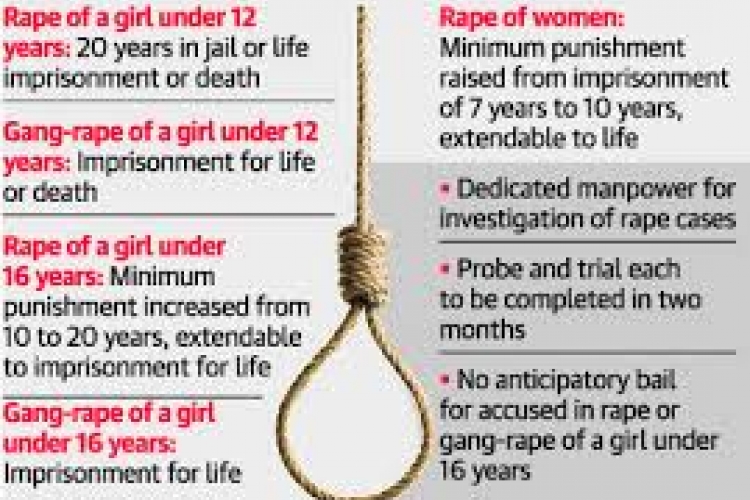Criminal Law (Amendment) Bill, 2018
The Lok Sabha has passed the Criminal Law (Amendment) Bill, 2018. The main highlight of the bill is that it seeks to amend the Indian Penal Code (IPC), the Evidence Act, the Code of Criminal Procedure (CrPC) and the Protection of Children from Sexual Offences (POCSO) Act to introduce a new provision to sentence convicts of such crimes punishment of death.
Highlights of the Bill:
- It provides for stringent punishment including death penalty for those convicted of raping girls below the age of 12 years.
- The minimum punishment in case of rape of women has been increased from rigorous imprisonment of seven years to 10 years, extendable to life imprisonment.
- In case of rape of a girl under 16 years, the minimum punishment has been increased from 10 years to 20 years, extendable to imprisonment for rest of life, which means jail term till the convicts’ “natural life”.
- The punishment for gang rape of a girl below 16 years will invariably be imprisonment for the rest of life of the convict.
- Stringent punishment for rape of a girl under 12 years has been provided with the minimum jail term being 20 years which may go up to life in prison or death sentence. Gang rape of a girl under 12 years of age will invite punishment of jail term for the rest of life or death.
- The measure also provides for speedy investigations and trial. The time limit for investigation of all cases of rape has been prescribed, which has to be mandatorily completed within two months.
- The deadline for the completion of trial in all rape cases will be two months. A six-month time limit for the disposal of appeals in rape cases has also been prescribed.
- There will also be no provision for anticipatory bail for a person accused of rape or gang rape of a girl under 16 years. It has also been prescribed that a court has to give notice of 15 days to a public prosecutor and the representative of the victim before deciding bail applications in case of rape of a girl under 16 years of age.
Why this bill?
The number of reported cases of rapes of children increased in India by 82% in 2016 compared to 2015. A climate of violence, social and economic insecurity, alienation, and a progressive undermining of the status of women and children seem to have given an impetus to carry out crimes against women and children.
Therefore, the legal system must give a clear signal that we as a nation consider the rape of children below the age of 12 as among the most heinous of offences. Making such crimes punishable by capital punishment certainly gives such a signal.
Effectiveness of the bill?
Statistics have not been able to prove or disprove the efficacy of capital punishment as a deterrent. While the U.K. has seen an increase in murders since 1965 when capital punishment for murder was removed from the statute book, Canada has not seen any such impact since it abolished the death penalty in 1976. The underlying socio-economic conditions in a society that cause crimes seem to have as much of an impact on the increase or decrease of crimes as the law does.
What needs to be done?
It is not the severity of the punishment but the certainty and uniformity of it which will reduce crime. Even for capital punishment to work as a deterrent, the fairness of the investigation, the certainty of conviction, and the speed of the trial are vital. With the police and judicial independence being under a cloud, especially after the incidents in Kathua and Unnao, the deterrent value of capital punishment seems diminished unless police reforms and fast-track courts are a part of the package.
Sources: the hindu.


 IAS -2025 Prelims Combined Mains Batch - III Starts - 14-04-2024
IAS -2025 Prelims Combined Mains Batch - III Starts - 14-04-2024